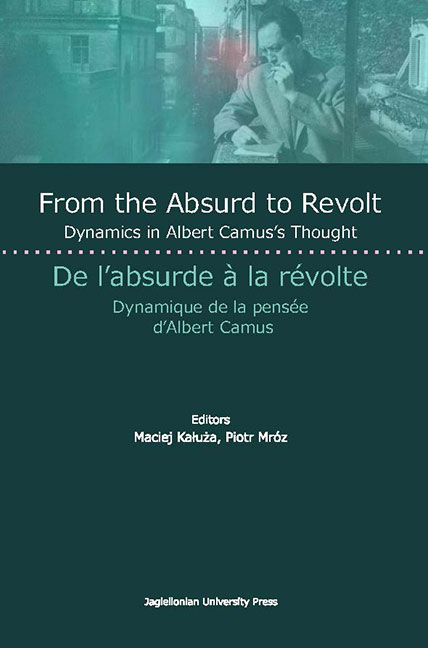Book contents
- Frontmatter
- Contents
- Introduction
- Part One From the Absurd to Revolt, Analysis of Sources for Camusian Concept of Revolt
- Part Two Camus's Revolt in Contemporary Analysis
- Part Three Camus's Revolt in Comparatistic Studies
- “I Hope This Ireland We're Fighting for is Worth It”: Camus’ L'Homme Révolté through Ken Loach's The Wind That Shakes the Barley
- Vers le dialogue: Albert Camus et Leszek Kolakowski
- Le rire de Sisyphe et la danse de Zarathoustra
- Is a Rebel an Outsider? Rebellion in the Interpretation of Colin Wilson
- Il faut sauver les jeunes filles qui se précipitent d'un pont: pour un renouvellement de la lecture de L'Envol de J. Iwaszkiewicz (1957)
Is a Rebel an Outsider? Rebellion in the Interpretation of Colin Wilson
from Part Three - Camus's Revolt in Comparatistic Studies
Published online by Cambridge University Press: 22 December 2017
- Frontmatter
- Contents
- Introduction
- Part One From the Absurd to Revolt, Analysis of Sources for Camusian Concept of Revolt
- Part Two Camus's Revolt in Contemporary Analysis
- Part Three Camus's Revolt in Comparatistic Studies
- “I Hope This Ireland We're Fighting for is Worth It”: Camus’ L'Homme Révolté through Ken Loach's The Wind That Shakes the Barley
- Vers le dialogue: Albert Camus et Leszek Kolakowski
- Le rire de Sisyphe et la danse de Zarathoustra
- Is a Rebel an Outsider? Rebellion in the Interpretation of Colin Wilson
- Il faut sauver les jeunes filles qui se précipitent d'un pont: pour un renouvellement de la lecture de L'Envol de J. Iwaszkiewicz (1957)
Summary
Colin Wilson, an English writer, philosopher and novelist, nowadays seems to be a somewhat forgotten thinker in the area of contemporary philosophy that emphasizes individual existence, freedom and choice. Nonetheless, his main work, The Outsider, together with some reflections and conclusions included therein, still remains a valuable source of inspiring ideas for subsequent generations of humanists. Considerations comprised in The Outsider oscillate around such problems, as: social alienation; possibilities to live free; nihilism and a negation of reality; relation between ideal world and material world; identity and social masks or a problem of effective expression of oneself. The main aim of the article is to compare the idea of Camus’ “rebel” with Wilson's idea of an “outsider” and to answer two questions:
1) what are the functions of the phenomenon of rebellion according to both thinkers?
2) are these functions of rebellion similar?
Colin Wilson named his philosophical conception “new and optimistic existentialism” and “phenomenological existentialism.” He wrote: “I have attempted to outline a ‘new existentialism’ that will possess what is so notably lacking in Heidegger and Sartre – the possibility of future development. […] I have preferred to speak of a ‘new existentialism’ rather than a ‘phenomenological existentialism’ because it is less of a mouthful; but later the two terms are used as interchangeable.” In his project of phenomenological existentialism Wilson made a few crucial assumptions, which were already seen in his main work The Outsider: (1) metaphysical dualism (an outsider lives between the reality of thoughts or mind and the reality of empirical experience); (2) the sphere of thoughts is ruled by hardly discovered spiritual laws; (3) the sphere of thoughts can directly be accessible by phenomenological reduction (Einklammerung) or so-called instant mysticism and some psychoactive substances; (4) freedom exists and is possible to experience through a limit situation (Grenzsituation) or crisis. It is worth reminding that, in his work, Wilson distinguishes many types of outsider due to the kind of their activity, temperament and the way of expression.
- Type
- Chapter
- Information
- From the Absurd to Revolt/De l'absurde a la Revolte , pp. 235 - 246Publisher: Jagiellonian University PressPrint publication year: 2017



